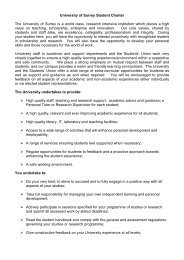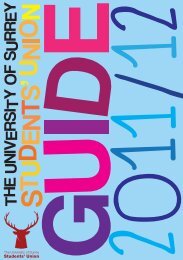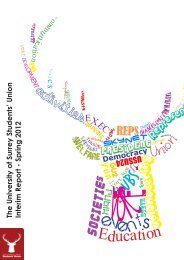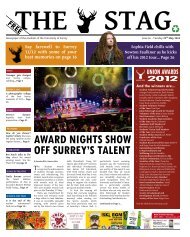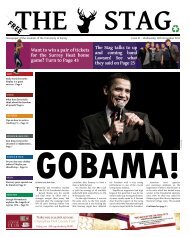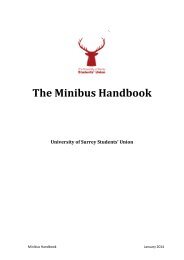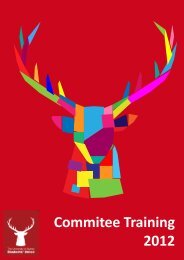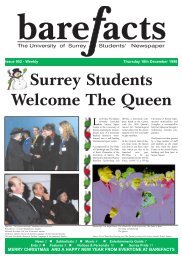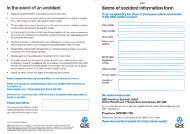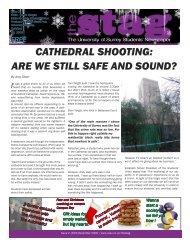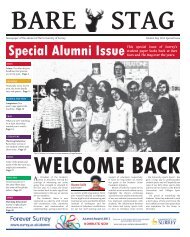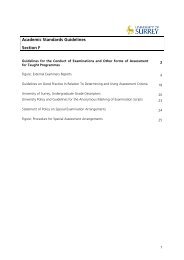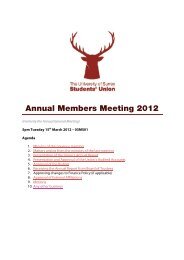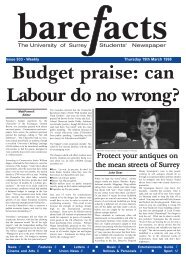AWARD NIGHTS SHOW OFF SURREY'S TALENT - University of ...
AWARD NIGHTS SHOW OFF SURREY'S TALENT - University of ...
AWARD NIGHTS SHOW OFF SURREY'S TALENT - University of ...
Create successful ePaper yourself
Turn your PDF publications into a flip-book with our unique Google optimized e-Paper software.
Lit Editor: Alexandra Wilks | Copy Editor: Candice Ritchie<br />
Literature<br />
By Becky Richmond, Literature Team<br />
It’s a ‘dog-eat-dog’ world out there, or should I say, it’s a<br />
‘word-eat-word’ world out there? Research has shown that<br />
there is a ‘Darwinian’ struggle for the survival <strong>of</strong> certain<br />
words.<br />
An international team <strong>of</strong> scientists, including scientists<br />
from the <strong>University</strong> <strong>of</strong> Boston and IMT Lucca, have followed<br />
the application <strong>of</strong> certain words over a 209-year period, from<br />
languages such as English, Spanish and Hebrew. The research<br />
found that there is a “drastic increase in the death rate <strong>of</strong><br />
words”. Autocorrect and strict editing processes eliminate<br />
misspelled and nonsensical words which is how a lot <strong>of</strong> new<br />
words are born.<br />
A message from Alexandra:<br />
The Stag | 22 nd May 2012<br />
I’ve had a brilliant time as Literature Editor <strong>of</strong> The Stag, it’s been a great<br />
year and I’ve had a wonderful team behind me. I leave this section in the very<br />
capable hands <strong>of</strong> Emily Smart, whose name you’ll no doubt recognize from<br />
these pages already. A massive thank you to all my lit girls: Rachel T,<br />
Rachel B, Sophie, Tessa, Becky W, Becky R and <strong>of</strong> course Emily.<br />
LiTERATURE 23<br />
In conversation with Ben Hatch<br />
Ben Hatch, author and family man, talks to The Stag about<br />
his award winning book Are We Nearly There Yet?<br />
By Emily Smart, Literature Team<br />
The Stag: Hi Ben, to begin can you tell me a little about<br />
your novel Are We Nearly There Yet?<br />
Ben Hatch: It’s based on an 8000 mile road-trip my<br />
wife and two kids completed around Britain, where we<br />
tried to visit as many attractions as possible to research<br />
a guidebook. The story <strong>of</strong> our travels, that includes us<br />
being frightened by a ghost, Nazis, attacked by bats and all<br />
ending up in hospital, is set against the background <strong>of</strong> my<br />
dad’s declining health. Someone descried it as a memoir<br />
disguised as a travelogue that reads like a novel. But it’s<br />
also a comedy. I’m pleased to say it made John Cleese laugh.<br />
TS: Travelling 8000 miles in 140 days to ensure that you<br />
gave your readers an honest and thorough guide seems<br />
extremely dedicated but tough…was there ever a moment<br />
where you felt like turning the car around and driving<br />
home?<br />
BH: Many times. In particular, the day I took my<br />
daughter for a nature wee in a field <strong>of</strong> liver ordnance in<br />
Otterburn. There was a sign on the gate I didn’t see that<br />
read, ‘underneath a skull and crossbones: debris might<br />
explode and kill you’. It was the same day a live bat became<br />
However, it’s not only autocorrect that is preventing<br />
the growth <strong>of</strong> our language, words are being replaced:<br />
‘Roentgenogram’ thus named after the discoverer <strong>of</strong> the<br />
x-ray has fallen out <strong>of</strong> use due to the introduction <strong>of</strong> ‘x-ray’<br />
or ‘radiogram’. Thanks to the short, efficient and easy<br />
pronunciation <strong>of</strong> the new words, the old die out. More reasons<br />
as to why words die out are because they’re replaced due to<br />
global events, such as wars. ‘The Great War’ was pushed out<br />
<strong>of</strong> circulation in around 1939 as a war <strong>of</strong> equal proportions<br />
began, so now we simply learn it was once called the ‘Great<br />
War’.<br />
So find the words with low usage, invent new words, and<br />
let’s not let the English language die out, or become one<br />
dimensional. Keep English alive.<br />
trapped in our lodge in the Kielder Forest and starting<br />
flapping around causing such panic in the family; it was a<br />
bit like a closing scene from the Lost World.<br />
TS: After winning the Radio 2 award for Book <strong>of</strong> the<br />
Year does this encourage you to want to write again soon?<br />
BH: I am writing a follow book to Are We Nearly There<br />
Yet? called The Road to Rouen at the moment. It’s about a<br />
10,000 mile road-trip around France.<br />
TS: Apart from travel writing, what genre <strong>of</strong> fiction<br />
interests you the most?<br />
BH: Contemporary fiction appeals to me most, though I<br />
do read other genres as well. I like a story that’s believable,<br />
that can hopefully move me and also make me laugh.<br />
TS: Lastly, with over 17,000 tweets and counting, do you<br />
feel that social networking sites have helped to promote<br />
your name and increase the readership <strong>of</strong> your book?<br />
BH: Definitely. I think it helps enormously. As well as<br />
being able to talk to other authors, it’s also an incredible<br />
way to directly reach out to readers. That’s never been<br />
available before. Thanks for the interview, Emily.<br />
The Death and Demise <strong>of</strong> Language<br />
© Calamity Meg



